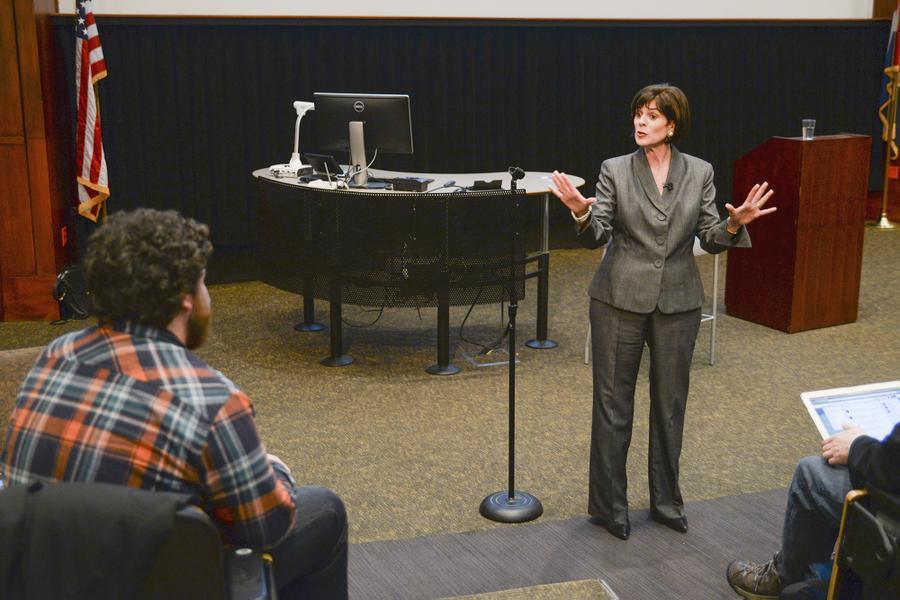The MU School of Journalism invited Dr. Sonya Forte Duhé, one of four finalists for the position of dean at the school, for an open forum Thursday.
Duhé, currently director and professor at Loyola University’s School of Mass Communication, was introduced by School of Law Dean Gary Meyers, who is leading the search committee, before she began a short presentation on the future of journalism education.
She started by discussing the changing landscapes of the media industry and its shifting goal of responding to various demands of diverse audiences.
“We’ve all seen dramatic changes in the mass communication industry, from the move to digital, to the proliferation of social media,” Duhé said. “Consumers want information on demand, anywhere, at any time.”
Duhé shared her observation on the rise of new media, particularly social media. She said digital trends like the ability to share news instantaneously and the use of “robust analytics to determine the best way to engage with the audience” also applied to strategic communication as much as the news media.
Duhé went on to envision the future of journalism education, citing the successful transformation of [The Maroon](http://www.loyolamaroon.com/), a student newspaper at Loyola University, as an example of development.
“We must be innovative,” she said. “Students must be able to practice their profession — yes, I believe in the Missouri Method — and they must do that for multiple platforms.”
Despite the changing landscape of media, Duhé said, ethics should always remain a central part of journalism education.
“Walter Williams got it right — we must have solid ethics,” she said. “No matter what the platform is, today or tomorrow.”
Duhé said the curriculum for journalism education should be “nimble” and “flexible” in order to meet the requirement of the ever-changing industry.
“This, in my opinion, is probably one of the most exciting times to be in journalism education,” she said. “When we look down the road a few years from now, we may even say this is the new golden age of mass communication.”
When asked about her future plans if hired as dean, Duhé said her goal is faculty-oriented, and that the first thing she would do is host a retreat with faculty. She said she would also examine programs and resources available at the school and plan three years ahead.
“I’m the real believer in faculty governance,” Duhé said. “The dean should not come in and decide, ‘This is the way things are going to be.’ It’s got to be what the faculty want, and it’s the dean’s job to get the resources to make it work.”
Duhé addressed the issue of raising funds for journalism programs and said she had much experience with fundraising. Duhé said she obtained a certificate on fundraising management while a fellow of the [American Council on Education](http://www.acenet.edu/Pages/default.aspx) in 2000 and raised funds for the University of Carolina and Loyola University.
Duhé said if she were to helm the School of Journalism, she would focus on the school’s research and MU’s membership in the [Association of American Universities](http://www.aau.edu/).
“It’s not just any journalism school, it’s an AAU university,” she said. “Research is critical. To me, great research is going to help inform what we teach in class and what we do in industry.”
In her final remarks, Duhé said strategic planning is key to maintaining the school’s national prestige and its excellence across programs.
Frank Russell, a doctoral student representing graduate students on the search committee, said working closely with faculty and industry professionals is a good quality to look for in a prospective dean.
“She intends to interact with both faculty and the industry to determine the future of the J-school; I think that’s a good approach,” Russell said. “I’m also interested in hearing what the other three candidates have to say about that.”
Associate Dean Lynda Kraxberger, another member of the search committee, said she was impressed by Duhé’s focus on planning and fundraising, and looks forward to hearing from the other three candidates as well.
“I think (Duhé) identified that we need a strategic plan as a school,” Kraxberger said. “Not just a strategic plan that’s put in a drawer, but a strategic plan that we use to follow in terms of where our faculty put their energy, where we encourage students to put their energy, and also where we put our resources.
“I was very impressed that she spoke a lot about resources, and that her job as dean is to create a framework by doing fundraising for us. I was quite pleased to hear that.”














